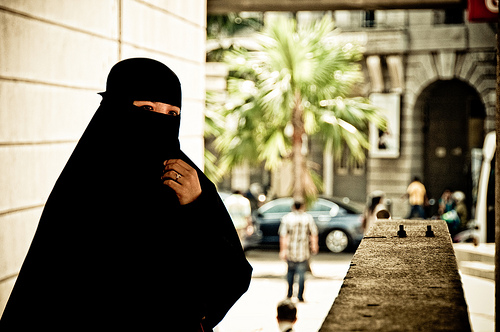

In November, a convicted terrorist escaped from jail by disguising himself as a woman wearing a burqa, forcing police to introduce new security checks.
Roki Aprisdianto, 29, was serving a six-year sentence for bombings in Central Java between December 2009 and January 2011. One of six men imprisoned for the blasts, he is considered the leader of the cell.
According to a police investigation, Roki disguised himself as a woman and walked out of Jakarta Metro Police Headquarters at midday on November 6th, a time when about two dozen women in burqas were visiting detainees incarcerated there.
His action has prompted security personnel to take action in order to prevent similar escapades in the future. Women in burqas who seek to visit terrorist detention centres will now be required to reveal their faces to female guards.
“All of those entering and leaving [the Jakarta Police detention centre], including people in burqas, will be checked,” National Police Inspector General Suhardi Alius announced, according to The Jakarta Globe. Previously, burqa-clad women were only required to surrender their identity cards while visiting prisoners.
Militants bring stigma to innocent women
The burqa escape has prompted heated discussion among women who choose to wear Muslim garb.
Siti Musdah Mulia, 54, an Islamic scholar from the Indonesian Conference on Religion and Peace, agreed that burqa-clad women visiting detainees need to lift their veils for identity and security reasons.
“At the State Islamic University Syarif Hidayatullah (Jakarta), where I am teaching, I don’t allow any of my female students to wear burqas in my class, because I cannot identify whether they are my students or not,” Musdah, who wears a hijab, told Khabar Southeast Asia.
“I will not let them join my class,” she said.
Setianingrum, 38, a resident of Yogyakarta who wears a burqa, disagreed with the inspection, especially if it involves policemen.
“It is not fair for us to be held responsible for this. The escape of the Indonesian terrorist must not impact us,” Setianingrum told Khabar via telephone from in Central Java.
But Baiq Marni Rosniah Kamardi, an Indonesian scholar who previously lived in Egypt and still wears a burqa, said that terrorists have once again hijacked a part of Islam for their own nefarious purposes.
“Terrorists should not use Islam to hurt people and again to escape behind the burqa. This is embarrassing,” Marni, 35, told Khabar via telephone from her home in Lombok, West Nusa Tenggara.
“I personally disagree with the Indonesian police’s decision to investigate every woman wearing a burqa. However, since this holy clothing was used by a terrorist to escape, I have no choice but to agree,” she added.
“Not only is our religion being blamed, but sadly now innocent Muslim women as well,” she said.
Changing times in Indonesia
Hijab and burqa have become more popular since the end of the Suharto regime in 1998, which restricted them from being worn in schools and government institutions. Even today, less than 5% of the population wears burqas.
In some parts of the country, however, regional regulations (Peraturan Daerah or Perda) have been established that require conservative dress.
In Aceh and in South Sulawesi, for example, Muslim women are required to cover everything but their faces, palms and feet, and Muslim men must cover themselves from the navel to the knee.



